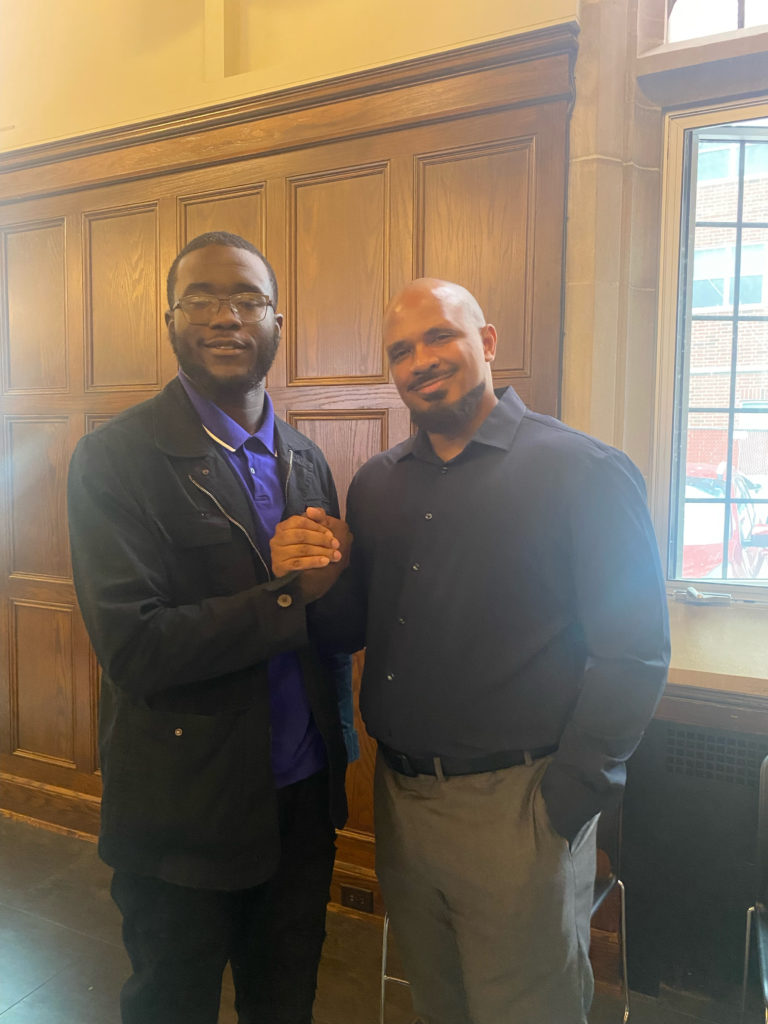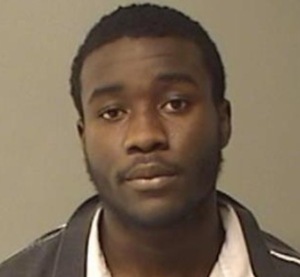
Shamar Betts (left) joined Alex Horton of Ubuntu at the YMCA Friday Forum podium October 13, as Horton described the real-life stakes of Black community organizing in Champaign-Urbana
Shamar Betts had no previous criminal record but was sentenced to three years in federal prison for “inciting a riot” through a Facebook post he wrote after witnessing the video of George Floyd’s murder in 2020. He was also made responsible for all the property damage and theft ($1.68 million) committed across town during that time of national anger. This excerpt from his forthcoming memoir describes his early impression of federal prison.
The online photo for the United States Penitentiary Hazelton (USP Hazelton) shows a grim, gray-colored brick wall marked by an entrance typical of any secure facility. But beyond the entrance a three-story chain link fence topped with razor wire is visible, a reminder that this is a facility for keeping people in, not out. USP Hazelton describes itself as a high-security prison for 1600 male offenders. An adjacent minimum security “camp” houses an additional ninety prisoners. Shamar Betts was transferred to federal custody in USP Hazelton on November 30, 2021. He would spend the next 18 months behind that gray wall.
I had been in several prisons by this time, but this was different. Hazelton was very structured, but until I learned the rules and routines it was a pretty confusing situation to walk into. For example, if you want to ask the guard a question you can never go by yourself. Why? People might say you were working with the cops if you are talking alone, so even if you want to just ask about the shower schedule you have to find someone to go with you.
There are also certain things you can’t do without permission, and this permission isn’t from the guards, but from other inmates. Inmates run a lot of the routines in the jail and you have to learn the entire system pretty quickly. For example, phones. Each unit has about 120 people on it and there are only six phones on that unit. Each phone belongs to a region or a race. There would be the Midwest phone (for inmates from Ohio, Milwaukee, Illinois, etc); another phone would be the DC or DMV phone (for Delaware, Maryland, and Virginia people); another phone for down South (Atlanta, Mississippi, Louisiana); and so on.
One person runs things like this for each section. They call us all together and tell each of us what time we can go to the phone or whatever. You need to be ready and if you aren’t, it’s a problem. Or if anyone interrupts the lineup, it’s also a problem. For example, sometimes people miss their spot and then try to grab someone else’s phone, and suddenly the whole Midwest gets into it with the whole down South. That’s like 80 people about to get into a big fight because someone messed up the routine. The people who run the section groups call the shots to avoid things like this.
The people in charge get there based on their resume, but it’s a little different from a resume on the outside. A person like me, who had never been in jail before and has only a four-year sentence, I didn’t get to run anything. I wasn’t calling any shots. I was bottom of the barrel because I was going home soon. But someone who has life, who’s been there thirty years, that’s someone who knows how to keep things structured. He’s been through everything already.
Your paperwork is the base for your résumé. You can’t go anywhere in the federal system without your paperwork, and I literally mean “paper.” You have to have a physical copy of your court transcripts that has everything that was said in the court decision, whether or not you made a plea agreement, how many years you got, if you went to trial . . . . If you were a snitch, it will say so. If you were a CHOMO (child molester), it will say that too. Everyone knows who they are because those people have their own “car,” or block of cells. They also have special restrictions. They can’t leave the cell, they can’t even go to the store. They have to pay people to go to the store for them. They might say, “here’s $150, keep $20 for yourself.” Even with the restrictions they still need friends to make sure no one kills them. They wash their clothes, do all types of stuff in return for protection.
When you arrive at a prison, you review your paperwork with the head person. They look it over and if they see you didn’t tell on anyone, if you didn’t do any sexual thing, if you are just a regular case, then you are clear. You walk out of there into the regular prison and no one needs any other announcement, they know you are stamped “OK.” And in the same way, the jail doesn’t need to tell anyone if you are dirty. If you have special restrictions everyone already knows that too.
The papers are the offender’s responsibility, not the system’s. Your papers have to be sent in by mail to the prison by your lawyer or your family. They might have to go to the courthouse, get a copy, print it off, and then it costs about $30 to send it. It’s not automatic. I didn’t have family in Urbana, but my lawyer, Lis, already knew about this. She told me to always tell her when I arrived anywhere so she could send in the paperwork. Some people don’t have good lawyers or family, though. And that’s just one of the things you need from outside.
The prison managers might decide whether you are on a special car [cell block] or are at risk, but inmates decide most of what is going on after that. At any federal prison the minute you walk in the door, some inmate is going to ask, “are you on man time?” (which means you back yourself up), or “are you on region time?” (which means your group is Chicago or DMV, wherever you are from) or “are you on gang time?” Your answer decides where you can sit. At chow, where we eat, there are specific tables for these groups, and there are also specific game tables, specific televisions, etc. You can’t just sit anywhere. You have to know where you fit in.
I sat at the Chicago table since I grew up in Chicago. The first time I was sitting there a guy asked me all these questions, trying to figure out what gang I was in. I said I was a “neutron,” (meaning I was neutral, not in any kind of gang), and he said I couldn’t sit there anymore because it was a gang table.
I started getting up to move my stuff, but then somebody else stood up and said “this isn’t a gang table, we’re just all in gangs. This is the Chicago table.” He told me, “It’s just that everyone from Chicago is in a gang.”
Anywhere I went in the prison system I was always the only person from Chicago that wasn’t in a gang and they didn’t ever quite know what to think of me.
Things like that were very confusing, for me and for them.

Shamar Betts is a graduate of Urbana High School who enjoys chess and reading. He is currently writing about his experiences after being arrested and sentenced to Federal Prison because of his Facebook post during the Black Lives Matter protests of 2020.
213 total views, 1 views today